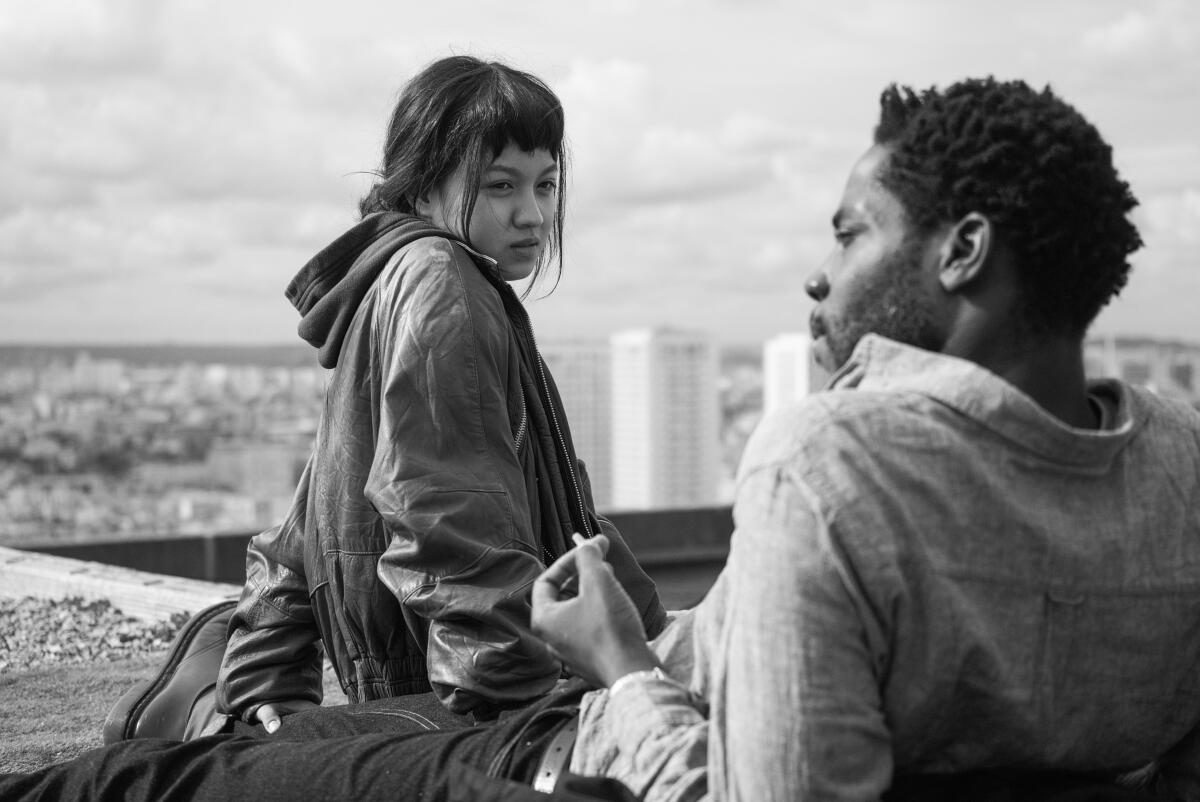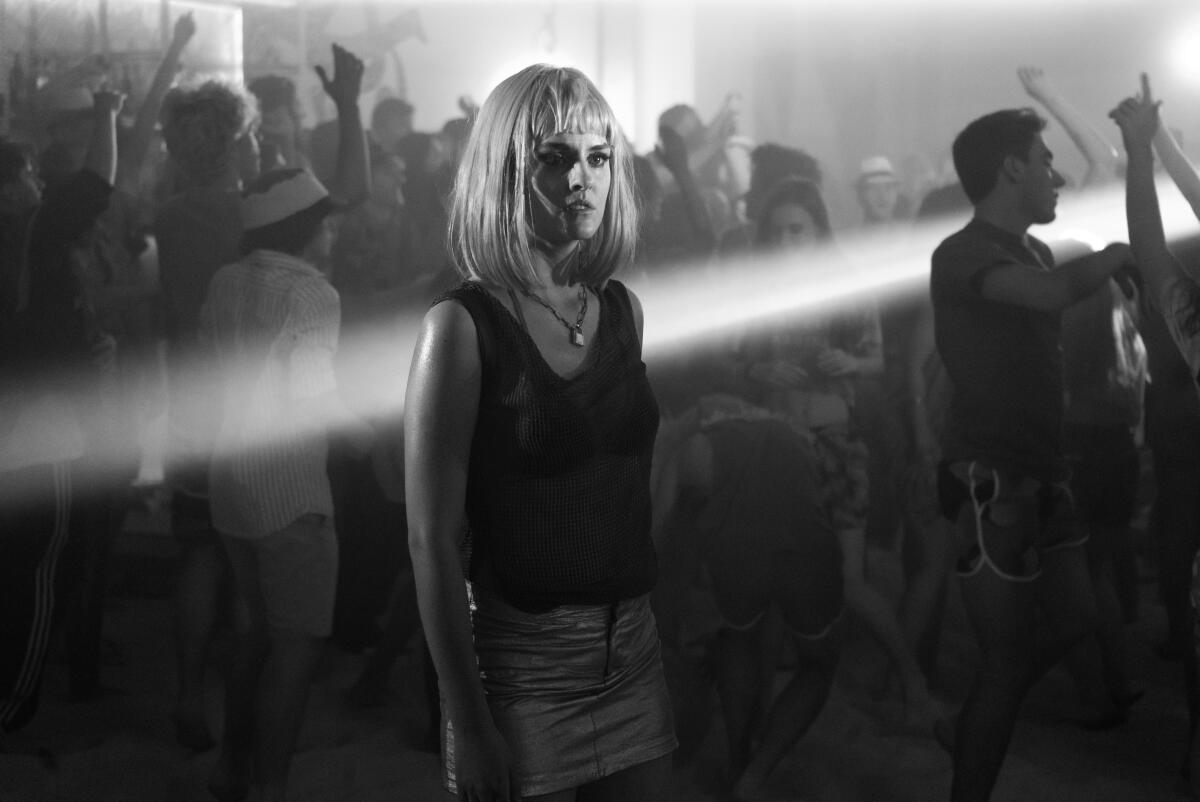Review: Romance and real estate mix in the sweet and sexy ‘Paris, 13th District’

- Share via
For the attractive, restless, easily distracted millennials drifting through “Paris, 13th District,” space is tight, money is tighter and decent work is tough to come by. Still, this loose-limbed romantic roundelay — gorgeously filmed in black and white by the French director Jacques Audiard — glows with a spirit of playful, limitless possibility. Coincidences and misunderstandings abound: A woman attends a party where she’s mistaken for a porn star. A housing agent and a painter working in the same apartment realize that, years ago, they were teacher and student: two young men with big dreams that they’ve now temporarily set aside for “a detour in real estate.”
And real estate, as you might have gathered, is central to the concerns of this lovely, absorbing movie, which takes place in and around the high-rise complex known as “Les Olympiades” (the film’s original French title). Its towers loom over Paris’ 13th Arrondissement, a riverside district known for its Brutalist flourishes, repurposed industrial buildings and sizable Chinese and Vietnamese communities. Audiard has always had a sharp eye for the overlooked, defiantly untouristy corners of his home city, especially in harrowing thrillers like “The Beat That My Heart Skipped” and “Dheepan.” But “Paris, 13th District” isn’t a crime story or a trawl through the lower depths. (The most extreme act of physical violence we see is a hard but well-earned punch.)
For your safety
The Times is committed to reviewing theatrical film releases during the COVID-19 pandemic. Because moviegoing carries risks during this time, we remind readers to follow health and safety guidelines as outlined by the CDC and local health officials.
Any warfare here is purely of the emotional and carnal variety. There are moments when Audiard’s protagonists could be starring in their own benign contemporary rewrite of “Les Liaisons Dangereuses,” describing their sexual conquests with ironic detachment and a soupçon of competitive brinksmanship. The first two legs of the triangle are Émilie (Lucie Zhang), a young Taiwanese French woman working a dead-end call center job, and Camille (Makita Samba), a Black doctoral student who answers her ad for a roommate. Camille, it should be noted, is a man, and a handsome enough one that Émilie falls into bed with him and agrees to rent him a room, in that order. Soon they’re roommates with benefits, an initially satisfying arrangement — for us as well, given the sensuality and candor with which Audiard films their lovemaking — that becomes complicated only when the commitment-averse Camille hits the brakes, leaving Émilie with the bitter realization that she had more strings attached than she thought.
That’s just the warm-up act of “Paris, 13th District,” a free-form adaptation of three short stories by the Japanese American cartoonist Adrian Tomine. Audiard, working with his co-writers Léa Mysius and Céline Sciamma (“Portrait of a Lady on Fire”), has uprooted those tales from drab American suburbia, pared away a few narrative elements, fused a few others together — expediently, if not always elegantly — and repotted them in what turns out to be surprisingly fertile French soil.
It’s not an immediately intuitive pairing of sensibilities; there’s little visual correspondence between Tomine’s wry, muted-color panels and the busy black-and-white images composed here by the cinematographer Paul Guilhaume, who likes to send the camera gliding through scene after scene. But Audiard has a deft way with source material (his recent adaptation of “The Sisters Brothers” is one of his best movies), and here he tucks Tomine’s bruising ironies and lacerating observations into a sturdy overarching narrative powered by garden-variety lust, all-consuming love and the mighty blasts of Rone’s electronica score.

The most carefully preserved of the stories follows Nora (Noémie Merlant), a white, 30-something law student who’s just moved into Les Olympiades. One night she attends a party wearing a vampy blond wig and learns that she’s apparently a dead ringer for a popular web-cam girl who goes by the nom de porn of Amber Sweet (an excellent Jehnny Beth). Harassed and humiliated by her peers — a development that Tomine handled more convincingly — Nora drops out of school and soon crosses paths with Camille, joining the real-estate agency that he’s now managing. While it may not surprise you to learn that Camille and Nora’s professional relationship soon tilts into the personal, nothing about their interplay — or Émilie’s gradual return to Camille’s orbit — feels predictable or circumscribed.
Outcomes aren’t really the point here anyway. While Audiard likes his characters too much to deny them a happy ending, he knows better than to trust that love, especially young love, offers any hope of permanence. (One romance builds to a close-up of a passionate kiss that’s beautifully filmed — and over so suddenly you can still feel it pulsing for a few moments after it vanishes.) He’s more interested in shading in the narrative ellipses and bringing out the workaday texture of his characters’ worlds. Working deftly with his longtime editor, Juliette Welfling, he immerses us in supermarket trips and subway rides, long work days and blissful karaoke nights. He also introduces us to Camille’s kid sister (Camille Léon-Fucien), who aspires to be a stand-up comedian (a thread borrowed from Tomine’s story “Killing and Dying”) and Émilie’s ailing grandmother (Xing Xing Cheng), who lives in a nearby nursing home.
Mostly, Audiard leans assuredly on his actors, gently pushing each one toward a simple, ordinary, never-irrelevant question — what does your character want? — and coaxing forth an utterly unique answer. Merlant, so good as the lovestruck painter in Sciamma’s “Portrait of a Lady on Fire,” digs deep into Nora’s indecision, laying bare her insecurities about the future as well as her unorthodox romantic past. Samba, as the story’s emotional fulcrum and bookish Lothario, makes Camille both mellow and magnetic, someone whose sensitivity and openness to the many women passing through his life can be both vice and virtue.
The revelation here is Zhang, making a remarkable screen debut as the movie’s most stubborn figure: Her Émilie can be selfish, vain, impulsive and demanding, but she also has a core integrity, a certainty about who she is and what she desires, that makes it hard not to root for her. Émilie can blend in with a crowd, as she does with the women she works with and befriends at a Chinese restaurant. But then Audiard films her pirouetting in slow motion through that same restaurant, in a joyous hallucination of a sequence that becomes its own glorious expression of ardent, unbridled desire.
‘Paris, 13th District’
In French with English subtitles
Rated: R, for strong sexual content throughout, graphic nudity, language and some drug use
Running time: 1 hour, 45 minutes
Playing: Starts April 15 at the Landmark, West Los Angeles; Laemmle Playhouse 7, Pasadena; Laemmle Noho 7, North Hollywood
More to Read
Only good movies
Get the Indie Focus newsletter, Mark Olsen's weekly guide to the world of cinema.
You may occasionally receive promotional content from the Los Angeles Times.











